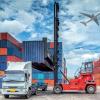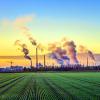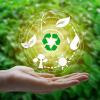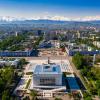News
Displaying Results 1 - 25 of 133
The technology associated with low-cost sensors (LCS) to monitor air quality has seen rapid developments over the past few years. While their use becomes more widespread and some are promoting them as silver bullet for air pollution science and control, experts have advised caution.
It is clear…
The United Nations Code for Trade and Transport Locations, UN/LOCODE in short, a UNECE flagship product, is a geographic coding scheme that uniquely and unambiguously identifies locations worldwide for transport and economic activities. In its role as a fundamental cornerstone of the global trade…
Ecosystems are highly sensitive to air pollution. To sharpen emissions reductions measures under the UNECE Convention on Long-Range Transboundary Air Pollution, expert groups have started scientific and technical work to support decision-making in the context of the process to revise the Protocol…
Addressing the Tashkent International Investment Forum (2-3 May 2024), UNECE Executive Secretary Tatiana Molcean called for the mobilization of private sector investments to support the implementation of the Sustainable Development Goals (SDGs) and to foster regional cooperation in Central Asia.…
As the climate warms, wildfires are becoming more frequent. Parts of Southern Europe, such as Spain and Greece, have already seen their first wildfires of the season, with devastating impacts on local ecosystems and biodiversity. Wildfires, however, also have major impacts on global and regional…
As we move beyond the midpoint of the 2030 Agenda and with only 12% of the Sustainable Development Goals (SDGs) on track, an immediate, globally coordinated push to meet the 2030 deadline is urgently needed. Sustainable Public-Private Partnerships (PPPs) and infrastructure finance are central in…
In today’s world of resource scarcity and the triple planetary crises of climate change, nature loss and pollution, many efforts are focused on developing new technologies, tools, products, and services that foster circular and sustainable consumption and production patterns across the textile,…
Following the decision of Parties to the UNECE Convention on Long-range Transboundary Air Pollution (Air Convention) to revise the Protocol to Abate Acidification, Eutrophication and Ground-Level Ozone (Gothenburg Protocol), which is expected to further strengthen efforts to reduce air pollution in…
Air pollution levels in Georgia are considered unhealthy with annual average of fine particles PM2.5 exceeding the World Health Organization's air quality guideline by at least three times.
To support Georgia in further improving its air quality management system, a new EU-funded project,…
Mapping air pollutant emission sources of a given country can help experts and decision-makers understand which policies are most viable. Spatial allocations of emissions are also important to understand where emissions are coming from on a regional level.
Spatially allocating – or gridding –…
Infrastructure projects are crucial for sustainable development, impacting not just economies but also communities and the environment. The tangible benefits they bring to people's lives can have a transformative effect and contribute to achieving the Sustainable Development Goals (SDGs). However,…
The global market for second-hand clothing has been multiplied by seven in the last 4 decades. The practice of exporting second-hand clothing from developed to developing countries has been intensified by the boost of the fast fashion industry, impacting the environment, social and human rights in…
Four years ago, when the COVID-19 pandemic hit, it disrupted the normal functioning of open markets. The ensuing crisis had crippling effects on global trade and productive capacities: it broke supply chains, reduced connectivity and slowed the flow of essential goods. Global food and energy…
The impact of different air pollutants on vegetation and crops has been studied for over 35 years in the framework of the UNECE Convention on Long-range Transboundary Air Pollution, through its International Cooperative Programme on Effects of Air Pollution on Natural Vegetation and Crops (ICP…
The Sustainable Development Goals (SDGs) require a massive transformation of our economies and societies, and a shift towards more sustainable patterns of production and consumption. Public-Private Partnerships (PPPs) are a powerful tool to support this transformation, as they can mobilise private…
The transport sector is responsible for 23% of global greenhouse gas emissions, with road transport accounting for around 77% of these emissions. As populations, economies, and the need for mobility grow, the World Bank estimates that greenhouse gas (GHG) emissions from transport could increase by…
Ensuring the principles of environmental democracy are upheld in relation to modified organisms/genetically modified organisms (LMOs/GMOs) can help countries to address biodiversity loss and support progress on a number of Sustainable Development Goals, in particular Goals 2 (zero hunger), 15 (life…
The Government of Ukraine is committed to rebuilding its infrastructure with a focus on achieving the Sustainable Development Goals (SDGs) and pursuing a resilient, inclusive and sustainable recovery.
However, the reconstruction and recovery needs of Ukraine are enormous and were estimated by…
Infrastructure is crucial for social and economic development. To achieve the 2030 Agenda for Sustainable Development, infrastructure needs to be green, climate resilient, circular, inclusive and fiscally sustainable, with people as the main beneficiaries. Infrastructure is also needed to rebuild…
Trade facilitation is a potent instrument that can multiply the benefits of trade. Beyond direct impact on economic growth through higher trade flows linked to improved efficiency at the borders, trade facilitation reforms can also contribute to other policy goals. For example, through the…
Cooperation and management of transboundary waters, which span over 45% of the world's surface and serve as vital resources for nearly half of the global population, face the imminent threat of underfunding. The last reporting exercise on Sustainable Development Goals (SDG) indicator 6.5.2 (2020),…
According to a recently published UNECE Policy Paper, the agrifood, the garment and footwear and the mineral sectors contribute significantly to the economic growth and employment in the UNECE region, while being major sources of global greenhouse gases (GHG) and environmental pollution. Evidence…
Transparency in the environmental performance of economic activities and effective public access to environmental information, especially on products, are indispensable in addressing pressing environmental challenges. This also supports a just transition towards a green and circular economy,…
In the UNECE region, the Fourth Cycle of Environmental Performance Reviews (EPR) kicks off with the review of Tajikistan, carried out for the fourth time under the leadership of UNECE.
A large, multidisciplinary team of international experts worked in Dushanbe from 6 to 15 November 2023,…
The European Commission has proposed a new legislation, the European Critical Raw Materials Act, to ensure a secure and sustainable supply of critical raw materials for the EU. The Act, on which the European Parliament and the European Council reached a provisional agreement on 13 November,…


























